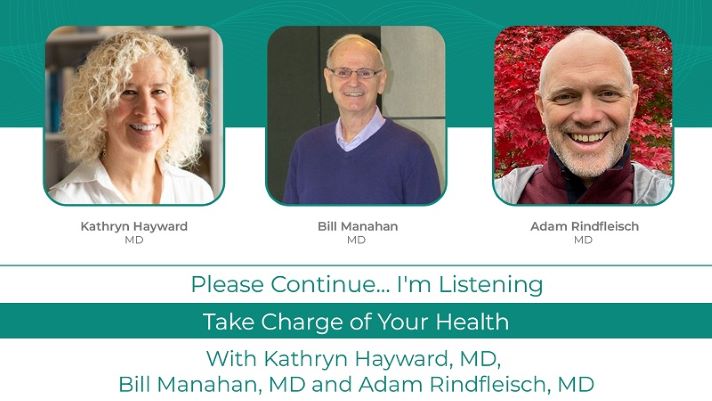Kathryn Hayward MD Podcast With Bill Manahan, MD And Adam Rindfleisch, MD:
We Recommend That You
Watch the conversation among Kathryn Hayward, MD, Bill Manahan, MD and Adam Rindfleisch, MD. Bill is Assistant Professor Emeritus, Department of Family Medicine, University of Minnesota Medical School and Adam is a Professor in the Department of Family Medicine and Community Health, University of Wisconsin School of Medicine and Public Health.
Along with other colleagues, Bill and Adam joined Kathryn in 2013 to co-found International Integrators and Living Whole Immersion Retreats. These three doctors have known one another for decades, each working within the conventional medicine system in the US to bring a more Whole Health approach to the systems within which they worked: Bill in Minneapolis, MN, Adam in Madison, WI and Kathryn in Boston, MA.
As three old friends and colleagues, Bill, Adam and Kathryn bring to this podcast some of the themes they have talked about for years as they work toward improving future health education and health care for medical practitioners, patients and everyone interested in health and healing.
Course Description
Have you ever wished that your medical practitioners had a better bedside manner?
When your professional dreams inspire you to be part of the medical profession, you devote yourself to years of studying, testing and applying. You envision yourself being compassionate and kind as you help your patients improve their health. However, many patients report that their experiences with medical practitioners are the opposite of compassionate. And many medical practitioners feel burned out and report that they are unhappy in their professions.
What happens to make this be so?
With decades of experience working in the conventional medicine system, Adam, Bill and Kathryn have some insights to share, and some suggestions for what you can do for yourself to enhance your healing and journey toward health.
Here are some of the themes that will engage you as you listen to their conversation:
- What do Adam, Bill and Kathryn mean by the term Whole Health?
- What vital information did Bill learn when he made a home visit on a young patient who had asthma?
- How do adverse childhood experiences and social determinants of health relate to the health of Individuals?
- What is slow medicine?
- What is fast medicine?
- How does positive thinking influence health?
- How does stress management influence health?
- How have the illnesses of Americans and the practice of medicine In the US changed since the 1950s and 1960s? How has medical education evolved during that same period?
- Bill and Adam each had personal experiences that caused them to look beyond the borders of the conventional medicine system. How did those experiences influence the care that they now give themselves and their patients?
- What has been happening in the Veterans Administration (VA) system in recent years with regard to Whole Health? How have veterans who were using opioids, getting medical care inemergency rooms and using pharmaceuticals been influenced by the Whole Health programs at the VA?
- What does it mean to include Energy Practices in support of health and healing?
The nurses began practicing healing touch. It is probably the reason that Energy Practices have gotten the status that they have, more than anything else, when suddenly tens of thousands of nurses were doing healing touch, and people who had problems for a really long time suddenly were better.
Bill Manahan, MD, on how nurses brought energy medicine into conventional medicine
- Why is skepticism important in looking at what should be offered in support of health and healing?
- Why are continuity of care and trust important elements of a primary care relationship?
- One criticism often aimed at people interested in Whole Health involves the assumption that there is a lack of evidence-based medicine. According to numerous studies, what percentage of medical care recommendations made by conventionally trained practitioners is actually based in science?
- Scientific American (2011): Health Care Myth Busters: Is There a High Degree of Scientific Certainty in Modern Medicine?
- "The Quality of Healthcare Delivered to Adults in the United States,"New England Journal of Medicine 2003;348:2635-2645.
- British Medical Journal of Evidence-Based Medicine: How Good is the Evidence to Support Primary Care Practice? (2017)
- Why is it important for a clinician to combine evidence-based medicine with intuition?
- An idea that Bill has had for the past 10 or 15 years is that the primary care practitioner of the future will be a health coach. In this model, what would the role of the health coach be in the life of the individual and the family?
With the pandemic, we realized that many workers can work from home. Part of education can happen at home. My idea is that we need more health coaching, and Living Whole Online is the perfect metaphor for what health coaching can be, because health coaching at its essence is looking at our mental, spiritual, social and ecological health.That’s the kind of programming that Living Whole Online offers. I see it as a universal health coach, because education of who we are as people and being able to make individual choices is key. The next step would be that people who want it would have access to a health coach in person through the program. This helps all these people attain a better level of health than they could do on their own.
-Bill Manahan, MD
